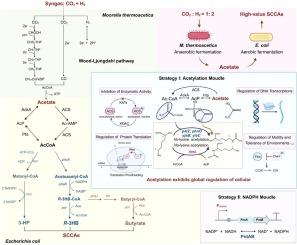Moorella thermoacetica 和经过代谢工程改造的大肠杆菌通过两阶段顺序生物工艺从合成气中负碳生产短链羧酸 (SCCAs)。
IF 9
1区 环境科学与生态学
Q1 AGRICULTURAL ENGINEERING
引用次数: 0
摘要
在厌氧条件下,利用热醋酸莫雷菌可将合成气高效转化为醋酸,而且对环境无害。再加上从合成气中生产醋酸盐,利用醋酸盐合成短链羧酸(SCCA)等高附加值化合物就成为一种负碳工艺。大肠杆菌经改造后可利用醋酸盐作为生产短链羧酸的唯一碳源。通过敲除一些乙酰转移酶基因,结合引入外源途径和额外的辅助因子工程,菌株可以合成 3.79 克/升的 3-羟基丙酸(3-HP)、1.83 克/升的(R)-3-羟基丁酸(R-3HB)和 2.31 克/升的丁酸。我们使用热乙酸梭菌从合成气中生产乙酸酯,随后,所有工程大肠杆菌菌株都能从合成气衍生的乙酸酯中生产短链氯化石蜡。3-HP、R-3HB 和丁酸的滴度分别为 3.75、1.68 和 2.04 克/升,固碳率分别为 51.1%、26.3% 和 38.1%。这种耦合生物工艺在利用合成气生产其他增值化学品方面具有巨大潜力。本文章由计算机程序翻译,如有差异,请以英文原文为准。

Carbon-negative bio-production of short-chain carboxylic acids (SCCAs) from syngas via the sequential two-stage bioprocess by Moorella thermoacetica and metabolically engineered Escherichia coli
Syngas can be efficiently converted to acetate by Moorella thermoacetica under anaerobic conditions, which is environmentally friendly. Coupled with acetate production from syngas, using acetate to synthesize value-added compounds such as short-chain carboxylic acids (SCCAs) becomes a negative-carbon process. Escherichia coli is engineered to utilize acetate as the sole carbon source to produce SCCAs. By knocking out some acetyltransferase genes, introducing exogenous pathway and additional cofactor engineering, the strains can synthesize 3.79 g/L of 3-hydroxypropionic acid (3-HP), 1.83 g/L of (R)-3-hydroxybutyric acid (R-3HB), and 2.31 g/L of butyrate. We used M. thermoacetica to produce acetate from syngas. Subsequently, all engineered E. coli strains were able to produce SCCAs from syngas-derived acetate. The titers of 3-HP, R-3HB, and butyrate are 3.75, 1.68, and 2.04 g/L, with carbon sequestration rates of 51.1, 26.3, and 38.1 %. This coupled bioprocess has great potential for producing a range of other value-added chemicals from syngas.
求助全文
通过发布文献求助,成功后即可免费获取论文全文。
去求助
来源期刊

Bioresource Technology
工程技术-能源与燃料
CiteScore
20.80
自引率
19.30%
发文量
2013
审稿时长
12 days
期刊介绍:
Bioresource Technology publishes original articles, review articles, case studies, and short communications covering the fundamentals, applications, and management of bioresource technology. The journal seeks to advance and disseminate knowledge across various areas related to biomass, biological waste treatment, bioenergy, biotransformations, bioresource systems analysis, and associated conversion or production technologies.
Topics include:
• Biofuels: liquid and gaseous biofuels production, modeling and economics
• Bioprocesses and bioproducts: biocatalysis and fermentations
• Biomass and feedstocks utilization: bioconversion of agro-industrial residues
• Environmental protection: biological waste treatment
• Thermochemical conversion of biomass: combustion, pyrolysis, gasification, catalysis.
 求助内容:
求助内容: 应助结果提醒方式:
应助结果提醒方式:


